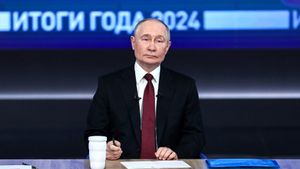JAKARTA - The World Bank's Lead Economist for Indonesia and Timor Leste Habib Rab suggested that Indonesia could immediately reform its subsidy policy, although the energy subsidies currently provided may be needed for short-term relief from pressured commodity prices.
"There are two important reasons why subsidy reform must be carried out," Habib said as quoted by Antara, Wednesday, June 22.
He said that the first reason is that the subsidies mostly benefit middle and upper class households because these households consume large portions of subsidized diesel and LPG.
If these two subsidies were replaced with social transfers targeted at the poor, vulnerable and middle class, the government could have an additional 0.6 percent of gross domestic product (GDP) for development priority spending.
"The recent decision to increase the price of certain fuels is welcome. But it will only have a small impact on subsidies," he stressed.
Habib added that the second reason for advocating for subsidy reform is that the provision of energy subsidies is only temporary in restraining inflation, so a gradual and measurable exit plan is needed.
The World Bank expects explicit energy subsidies to increase only slightly from 0.8 percent of GDP in 2021 to around 0.9 percent of GDP in 2022.
However, the implicit subsidies paid to State-Owned Enterprises (SOEs) to compensate for below-market electricity and fuel sales are projected to increase from 0.7 percent of GDP in 2021 to 1.5 percent of GDP in 2022.
"Thus, energy subsidies will indeed help maintain consumer price inflation in the short term and help sustain the recovery in domestic demand," he said.
The English, Chinese, Japanese, Arabic, and French versions are automatically generated by the AI. So there may still be inaccuracies in translating, please always see Indonesian as our main language. (system supported by DigitalSiber.id)








